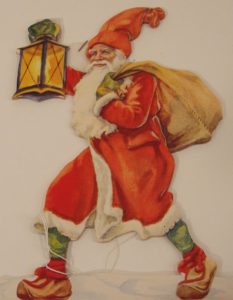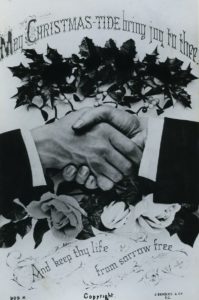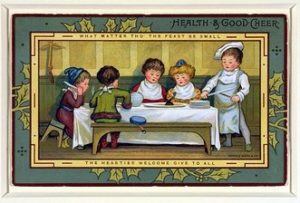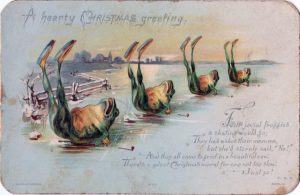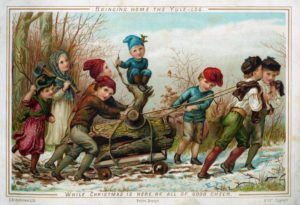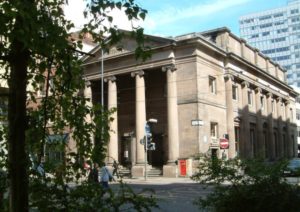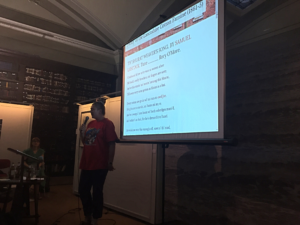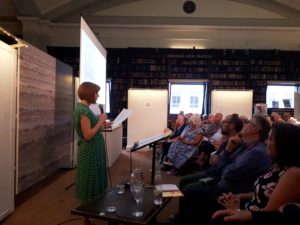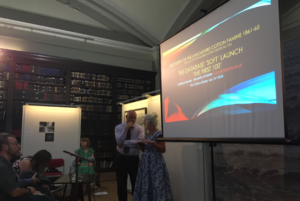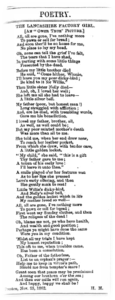Welcome to day six of our Cotton Famine Christmas Countdown! To get us in the festive (sort of) spirit, we’re featuring a seasonal Cotton Famine Poem every day in the run up to our special Christmas event with Jennifer Reid on 20th December. Free tickets for the event are available here: https://www.eventbrite.co.uk/e/the-twelve-cotton-famine-poems-of-christmas-tickets-52954230529
Today’s poem, ‘Father Christmas’, is from the Blackburn Times, December 24th 1864. The poet gives their name simply as the initials, F.P.A.
FATHER CHRISTMAS.
Old Father Christmas rose one day,
And he took his staff in hand,
Quoth he, “I’ll see who keeps me best
Throughout the Christmas land.”
So away he strode with the early dawn
Wrapped up in his robe of snow,
And he called on the glittering ice to form,
And the keen north wind to blow.
From far and near he heard the sound
Of the merry Christmas chime,
And the jovial Carol singers came
With many an ancient rhyme.
The holly shone in the casement old,
The mistletoe on high,
And from the hearthstone wide he saw
The sparks from the yule log fly.
The board was set with festive cheer,
The liveried menials wait,
All heedless of the shivering poor
Outside the castle gate.
They quaff’d no ruby drops nor saw
Their table simply spread;
Enough for them the daily toil
And scanty daily bread.
Too proud to beg, too poor to eat
Save of the coarsest fare,
Their hovel homes no fitting place
For human souls to share.
Old Father Christmas shook his head,
And he breathed a heavy sigh,
“God help the rich man, then,” he said,
“When such beside him lie.”
And the north wind bore the words away,
With a wild and wailing shriek,
As a good Samaritan drew near,
Kind, pitying words to speak.
He bound the wound, he dried the tear,
He cheer’d the spirit faint,
And listen’d with untiring zeal
To every mourner’s plaint.
And yet he wore no costly robe,
He own’d no stately hall,
And no long train of menials proud
Came forward at his call.
But in his heart lay hid a gem
A thousand times more rare
Than all the rich and precious things
The world could gather there.
“Such keep me best,” old Christmas said,
“Such have not learnt in vain
That well-fill’d barns and garn’d store
May not be always gain.”
So, draw a moral from my tale,
All ye with riches bless’d,
For they who spare to those in need
Are keeping Christmas best.
F.P.A.
Commentary
The secular figure of Father Christmas is used here as a rebuke to the hypocrisy of wealthy people who celebrate Christmas lavishly but without attention to those in need. The first two stanzas draw on traditional festive imagery, with holly and mistletoe, and a blazing fire to dispel the chill of the ice and snow, but this is quickly contrasted with the cold and sparse homes of the poor. The message, pointedly aimed at wealthier readers, is that the trimmings of the season mean little without attention to the duties of charity and love for one’s neighbour. Though the poem is not overtly religious, it does draw on Biblical themes, referencing the story of the Good Samaritan and hinting that the rich may find it more difficult to enter the kingdom of God.
Dr Ruth Mather, University of Exeter.
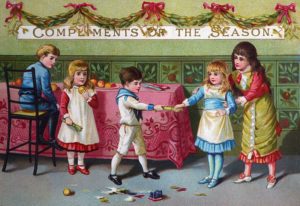
A Victorian Christmas Card, from Nova Scotia Archives on flickr.com
